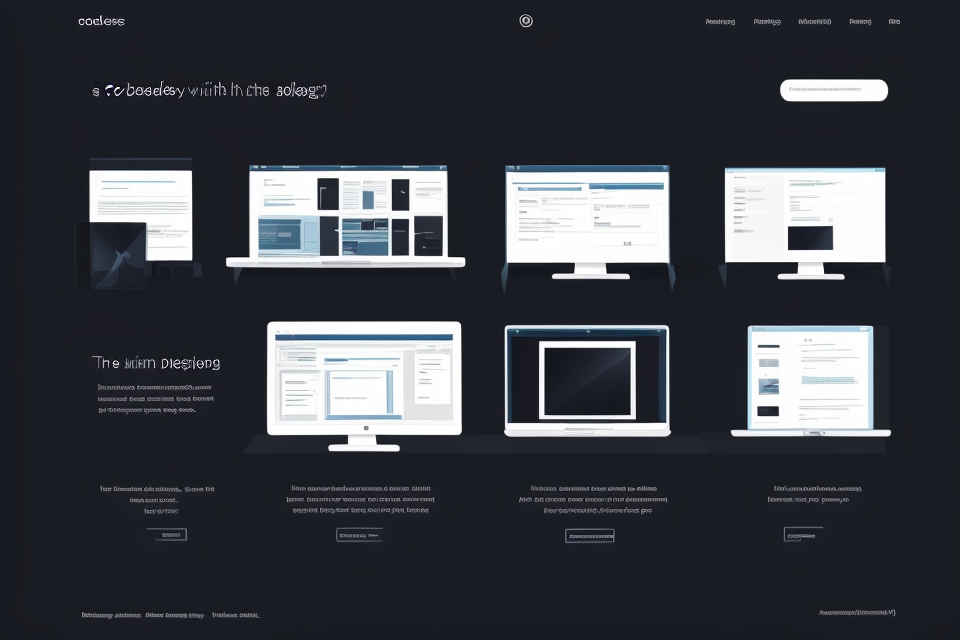Web development is an exciting field that involves creating and maintaining websites and web applications. Successful web developers have a passion for coding, problem-solving, and staying up-to-date with the latest technologies. They are skilled in programming languages such as HTML, CSS, JavaScript, and back-end languages like Python and Ruby. They also have an eye for design and understand user experience principles. Web developers must be able to work independently or as part of a team, communicate effectively, and be detail-oriented. In this article, we will explore the key skills and interests that make a web developer successful in this dynamic and ever-evolving field.
A successful web developer should possess a strong understanding of programming languages such as HTML, CSS, and JavaScript, as well as knowledge of back-end technologies like Ruby, Python, or PHP. They should also have a good understanding of database management and server administration. In addition to technical skills, a successful web developer should have a keen interest in design and user experience, as well as strong problem-solving and communication skills. They should be able to work collaboratively with other developers, designers, and project managers to deliver high-quality web applications that meet the needs of clients or users.
H2: Understanding the Role of a Web Developer
H3: Responsibilities of a Web Developer
As a web developer, one’s primary responsibility is to design and develop websites and web applications that meet clients’ needs and expectations. This involves working with a variety of programming languages, frameworks, and tools to create functional, visually appealing, and user-friendly websites. Additionally, web developers must be able to troubleshoot issues and maintain the websites and applications they create.
Collaboration is also a key aspect of a web developer’s role. They must work closely with designers, content creators, and other team members to ensure that the website or application meets all requirements and expectations. Communication skills are essential in this role, as web developers must be able to effectively communicate with clients and team members to ensure that everyone is on the same page.
In order to stay competitive in the industry, web developers must also stay up-to-date with new technologies and industry trends. This means continually learning and experimenting with new tools and techniques, as well as staying informed about changes in web development standards and best practices. This can involve attending conferences, reading industry publications, and participating in online communities. By staying up-to-date with the latest trends and technologies, web developers can ensure that they are always able to provide the best possible service to their clients.
H3: Types of Web Development
Web development can be divided into four main types, each with its own set of skills and responsibilities.
- Front-end development involves building the user interface and user experience of a website or web application. This includes tasks such as designing layouts, implementing navigation, and creating visual effects.
- Back-end development deals with the server-side of web development, including tasks such as server-side scripting, database management, and server configuration.
- Full-stack development is a combination of front-end and back-end development, and involves having the skills to work on every layer of the technology stack. This allows for a greater understanding of the entire development process and can make a developer more versatile and valuable in the job market.
- Mobile web development focuses on creating web applications for mobile devices, which requires an understanding of responsive design and mobile-specific technologies.
Understanding the different types of web development can help a developer choose the area that best suits their interests and strengths, and can also help them determine the skills they need to acquire or improve upon.
H2: Essential Skills for Web Developers
H3: Programming Languages and Frameworks
Importance of Programming Languages and Frameworks in Web Development
In web development, programming languages and frameworks play a crucial role in creating efficient, responsive, and scalable websites and applications. These tools provide web developers with the necessary building blocks to bring their ideas to life and solve complex problems. In this section, we will discuss the most commonly used programming languages and frameworks in web development and their importance.
HTML, CSS, JavaScript
HTML (Hypertext Markup Language), CSS (Cascading Style Sheets), and JavaScript are the foundation of web development. HTML provides the structure and content of a web page, while CSS is responsible for the presentation and layout. JavaScript, on the other hand, enables interactivity and dynamic behavior on web pages.
Mastery of these three languages is essential for any web developer, as they form the basis of all web development projects. Proficiency in these languages allows developers to create responsive and interactive web pages that provide a seamless user experience across different devices and platforms.
React, Angular, Vue.js
React, Angular, and Vue.js are popular JavaScript frameworks used for building web applications. These frameworks provide developers with pre-built components and tools to create complex and dynamic user interfaces.
React, developed by Facebook, is a powerful and flexible library for building user interfaces. It allows developers to create reusable components and manage state efficiently, making it ideal for building large-scale web applications.
Angular, developed by Google, is a comprehensive framework that provides developers with a complete set of tools for building web applications. It offers features such as dependency injection, data binding, and powerful templates, making it an ideal choice for building complex and scalable applications.
Vue.js, developed by a team of independent developers, is a lightweight and easy-to-learn framework that offers a clean and intuitive syntax. It provides developers with the necessary tools to build web applications with minimal overhead, making it an ideal choice for small to medium-sized projects.
Ruby on Rails, Laravel, Django
Ruby on Rails, Laravel, and Django are popular web development frameworks that use the Ruby, PHP, and Python programming languages, respectively. These frameworks provide developers with a robust set of tools for building web applications quickly and efficiently.
Ruby on Rails, developed by David Heinemeier Hansson, is a high-level framework that follows the principles of convention over configuration. It provides developers with a clean and simple syntax, making it an ideal choice for rapid web development.
Laravel, developed by Taylor Otwell, is a robust and feature-rich framework that provides developers with a comprehensive set of tools for building web applications. It offers features such as authentication, routing, and caching, making it an ideal choice for building complex and scalable applications.
Django, developed by Jacob Kaplan-Moss and Simon Willison, is a high-level framework that follows the principles of batteries included and don’t repeat yourself. It provides developers with a complete set of tools for building web applications, including an ORM (Object-Relational Mapping) system, a templating engine, and a powerful admin interface.
In conclusion, mastery of programming languages and frameworks is essential for any web developer. Proficiency in HTML, CSS, JavaScript, along with popular frameworks like React, Angular, Vue.js, Ruby on Rails, Laravel, and Django, provides developers with the necessary tools to build efficient, responsive, and scalable web applications.
H3: Problem-solving and Analytical Skills
- Debugging and troubleshooting
- Identifying and fixing code errors
- Testing and validating code changes
- Analyzing code performance and optimization
- Identifying and resolving technical issues
- Debugging and troubleshooting web applications
- Diagnosing and fixing server-side issues
- Identifying and resolving security vulnerabilities
- Analyzing user feedback and behavior data
- Collecting and analyzing user data
- Identifying patterns and trends in user behavior
- Implementing data-driven solutions to improve user experience
H3: Collaboration and Communication Skills
Importance of Collaboration and Communication Skills in Web Development
In the fast-paced world of web development, it is crucial for developers to possess excellent collaboration and communication skills. These skills enable developers to work effectively with team members, stakeholders, and clients, ensuring the successful completion of projects.
Collaboration Skills
Web development projects often involve working with a team of developers, designers, and other stakeholders. Effective collaboration skills are essential for ensuring that everyone is on the same page and working towards a common goal. This includes:
- Active Listening: Understanding and responding to the concerns and ideas of team members and stakeholders.
- Problem Solving: Working together to find solutions to technical challenges that arise during the development process.
- Teamwork: Coordinating efforts with team members to ensure that tasks are completed efficiently and effectively.
Communication Skills
As web developers, it is important to be able to communicate technical information to non-technical audiences, such as clients and stakeholders. Clear communication is essential for ensuring that everyone understands the project’s goals, progress, and any challenges that may arise. This includes:
- Explaining Technical Concepts: Ability to break down complex technical concepts into simple, easy-to-understand terms.
- Presenting Information: Communicating project updates and progress to clients and stakeholders in a clear and concise manner.
- Managing Expectations: Setting realistic expectations for project timelines and deliverables, and managing client expectations throughout the development process.
Project Management Skills
In addition to collaboration and communication skills, web developers must also possess strong project management skills. This includes:
- Time Management: Ensuring that projects are completed within the designated timeline, and that tasks are prioritized and completed efficiently.
- Task Management: Coordinating and tracking the progress of multiple tasks and projects simultaneously.
- Quality Assurance: Ensuring that projects meet the required standards of quality and functionality.
Overall, collaboration and communication skills are essential for web developers who want to work effectively with team members, stakeholders, and clients. These skills enable developers to manage project timelines and deliverables, and ensure that projects are completed successfully.
H2: The Interests of a Successful Web Developer
H3: Passion for Learning and Continuous Improvement
Being a successful web developer requires not only a strong foundation of technical skills but also a passion for continuous learning and improvement. This interest is driven by the rapidly evolving nature of technology and the need to stay competitive in the job market. To cultivate this interest, web developers should focus on the following areas:
Staying up-to-date with new technologies and best practices
Web development is a field that is constantly evolving, with new technologies and frameworks emerging regularly. Successful web developers must be committed to staying up-to-date with these advancements to ensure that they can create modern, efficient, and maintainable websites and applications. This requires a willingness to explore new tools and libraries, participate in online communities, and engage in discussions about best practices.
Attending conferences, workshops, and online courses
Attending conferences, workshops, and online courses is an excellent way for web developers to expand their knowledge and skills. These events provide opportunities to learn from experts in the field, network with other professionals, and discover new technologies and trends. Additionally, online courses and tutorials can help web developers develop specific skills or gain certifications that demonstrate their expertise to potential employers.
Reading blogs, articles, and technical documentation
Reading blogs, articles, and technical documentation is another essential aspect of a web developer’s continuous learning journey. These resources provide insights into various aspects of web development, such as front-end design, back-end development, security, and performance optimization. By reading and analyzing these materials, web developers can deepen their understanding of specific technologies, identify best practices, and discover new techniques for solving common problems. Furthermore, this habit helps web developers stay informed about industry trends and emerging technologies, enabling them to adapt their skills to new challenges and opportunities.
H3: Attention to Detail and Pursuit of Perfection
Web development is a meticulous and detail-oriented field that demands precision and perfection from its practitioners. A successful web developer must possess an innate curiosity and a keen interest in the finer aspects of their work. They must be driven by a desire to create websites and applications that are not only functional but also aesthetically pleasing and user-friendly. This requires a keen eye for detail and an unrelenting pursuit of perfection.
Ensuring the Quality and Consistency of Code
One of the primary interests of a successful web developer is ensuring the quality and consistency of their code. This involves adhering to established coding standards and best practices, as well as rigorously testing and debugging their work. A meticulous web developer will take great care to write clean, efficient, and well-organized code that is easy to maintain and update. They will also be adept at using various tools and techniques to identify and fix bugs, as well as to optimize the performance of their websites and applications.
Creating Intuitive and User-Friendly Interfaces
Another key interest of a successful web developer is creating intuitive and user-friendly interfaces. This requires a deep understanding of user behavior and preferences, as well as a keen eye for design and aesthetics. A skilled web developer will strive to create interfaces that are not only visually appealing but also easy to navigate and use. They will pay close attention to typography, color schemes, and other design elements, as well as to the layout and flow of their websites and applications. By doing so, they can create interfaces that are both functional and delightful to use.
Optimizing Website Performance and User Experience
Finally, a successful web developer must be interested in optimizing the performance and user experience of their websites and applications. This involves using various techniques and tools to improve site speed, reduce bounce rates, and enhance user engagement. A meticulous web developer will be committed to creating websites that are fast, responsive, and accessible to all users, regardless of their device or connection speed. They will also be interested in tracking and analyzing user behavior and feedback, as well as in continually refining and improving their websites and applications based on this data.
In conclusion, a successful web developer must possess a keen interest in attention to detail and the pursuit of perfection. They must be driven by a desire to create websites and applications that are not only functional but also aesthetically pleasing and user-friendly. By paying close attention to the quality and consistency of their code, creating intuitive and user-friendly interfaces, and optimizing website performance and user experience, a successful web developer can create websites and applications that are both functional and delightful to use.
H3: Creative and Innovative Thinking
Developing Innovative Features and Functionalities
Web developers with a strong interest in creative and innovative thinking are constantly looking for ways to push the boundaries of what is possible. They are not content with simply building websites that follow established patterns and designs. Instead, they aim to create unique and visually appealing websites that offer users an experience that is both engaging and enjoyable.
To achieve this, web developers with a creative mindset focus on developing innovative features and functionalities that set their websites apart from the competition. This might involve experimenting with new technologies, such as artificial intelligence or machine learning, to create websites that can adapt to user behavior or provide personalized recommendations. It could also involve exploring new design patterns, such as responsive design or progressive web apps, that offer a more seamless and intuitive user experience.
Finding Solutions to Complex Problems and Challenges
Creative and innovative thinking is not just about developing new features and functionalities. It is also about finding solutions to complex problems and challenges that arise during the development process. Web developers who excel in this area are skilled at identifying issues and coming up with novel approaches to solving them.
For example, a web developer might be faced with the challenge of optimizing a website’s loading speed. Instead of simply tweaking a few settings or using a pre-built optimization tool, a creative developer might explore alternative approaches, such as implementing a content delivery network or using server-side caching. By thinking outside the box and considering a range of possible solutions, they can find the best approach for the specific project.
Overall, creative and innovative thinking is a key interest of successful web developers. By constantly seeking out new ideas and approaches, they are able to create websites that are both visually appealing and functional, and that offer users an experience that is both engaging and enjoyable.
H3: Collaboration and Teamwork
Working effectively with other developers, designers, and stakeholders is crucial for a successful web developer. Building and maintaining positive relationships with clients and users is also important. Contributing to open-source projects and communities is another key aspect of collaboration and teamwork for a web developer.
To elaborate on collaboration and teamwork, it is important for a web developer to have strong communication skills. This includes being able to effectively communicate technical information to non-technical stakeholders, as well as being able to understand and incorporate feedback from team members.
Additionally, a successful web developer should be able to work well in a team environment. This includes being able to collaborate on code, share knowledge and expertise, and take constructive criticism. It is also important to be able to manage conflicts and work towards finding solutions that benefit the project and the team.
Furthermore, a web developer should be proactive in seeking out opportunities to contribute to open-source projects and communities. This not only helps to build skills and knowledge, but also helps to establish a reputation as a valuable member of the development community.
Overall, collaboration and teamwork are essential skills for a successful web developer. By working effectively with others, building positive relationships, and contributing to open-source projects, a web developer can build a strong reputation and make valuable contributions to the development community.
FAQs
1. What is the interest of a web developer?
Answer:
Web developers are responsible for creating and maintaining websites. They have a keen interest in programming languages such as HTML, CSS, JavaScript, and frameworks like React, Angular, and Vue.js. They also have an interest in design and user experience, ensuring that the website is visually appealing and easy to navigate. In addition, web developers must stay up-to-date with the latest technologies and trends in the industry to create high-quality websites that meet the needs of their clients or users.
2. What skills do I need to become a successful web developer?
To become a successful web developer, you need to have a strong foundation in programming languages such as HTML, CSS, and JavaScript. You should also have a good understanding of front-end frameworks like React, Angular, and Vue.js. In addition, it’s important to have problem-solving skills, the ability to work well in a team, and excellent communication skills. Other important skills include knowledge of back-end technologies such as Node.js and Python, as well as an understanding of database management systems like MySQL and MongoDB.
3. How can I improve my web development skills?
There are many ways to improve your web development skills. One of the best ways is to practice coding regularly and work on personal projects. You can also participate in online communities and forums, where you can ask questions and learn from other developers. Additionally, you can take online courses or attend workshops and conferences to learn about the latest trends and technologies in the industry. It’s also important to continually read and stay up-to-date with the latest news and trends in web development.
4. What is the job outlook for web developers?
The job outlook for web developers is positive, with a projected growth rate of 8% from 2020 to 2030, which is faster than the average for all occupations. The demand for web developers is expected to increase as more businesses move online and require websites and web applications to meet their needs. Additionally, the rise of e-commerce and mobile devices has increased the demand for web developers who can create responsive and user-friendly websites that work well on multiple platforms. With the right skills and experience, web developers can find good job opportunities in a variety of industries.
Early Career Software Engineer, Web Developer, & Front End Engineer Salaries
https://www.youtube.com/watch?v=ao12yHmZQRA



